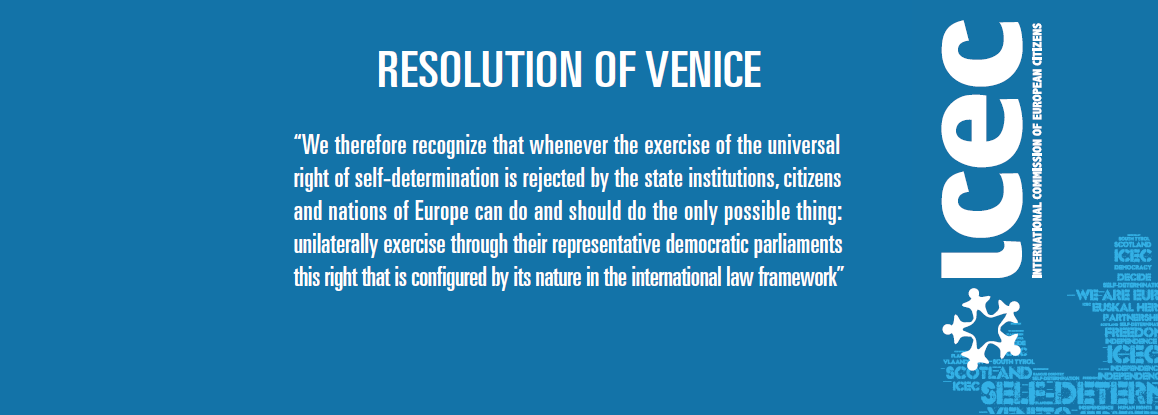ICEC - International Commission of European Citizens, is an NGO created to gather all those organisations, institutions and individuals who share the vision of a Europe which is democratic both in theory and reality.
Social movements from Scotland, Catalonia, Flanders, Euskal Herria, Veneto and South Tyrol together with social representatives from other European nations, but as well member states, use ICEC as a focal point forum and meeting place where academic and socio-political theories regarding European Democracy and Human Rights, can be discussed and disseminated.
ICEC represents a coordinated citizen’s alliance on a European level to express the will of millions of Europeans who strongly defend core principles as Freedom, Justice, Equality and Peace within Europe. Being the exercise of the Universal Right of SELFdetermination of Peoples a fundamental founding point to warranty such values.
The Commission is composed of members of social organizations, political parties and academic networks on an individual basis, although organizations can expressly give their support as such. ICEC membership is not limited to any field because of its ‘down to earth’ grassroots approach, making it expressly open to the general public regardless of their involvement within any organization.
As one of the fathers of the European Union stated:
“…is not the union of the states but of the citizens” - Jean Monnet
A better democracy is possible and it is needed, it is up to all European Citizens to speak with a clear and organized voice on these matters alongside our shared European Institutions.
Together we will make it possible! Because WE ARE EUROPE.
Resolution of Venice ( Venetian Parliament 29th November 2016 - Brussels 11th January 2017)

#### Declaration of Brussels (Brussels, European Parliament 9th December 2015)
Recognising the unique cultural and linguistic diversity of the European Union and in acknowledgment of one of the EU’s maxims ‘United in Diversity’;
Understanding the need for debate and cooperation on the status and future of states in creation, their language, cultural identity, socio-economic preferences and self-organisation to understand the democratic role that future nations can play worldwide;
Agreeing that two universal principles are enshrined in international charters,
* Firstly the “principle of freedom of choice”, a principle belonging to individuals as well as to the communities of which these individuals form part of by free and democratic choice,
* Secondly the right of self-determination that is recognised worldwide and confirmed through international treaties.
Believes that the democratic future of the European Union will be strengthened through debate and understanding of the general principles. Further believes that only through engagement and cooperation with organisations and communities can the founding principles of the EU be enhanced and fully recognised.
Hopes that through working with these organisations and communities a deeper understanding tod the principles of self-determination will be reached for the benefit of all the EU and its citizens.
The undersigned organisations and persons at this Declaration do hereby confirm:
* Self-determination enriches and strengthens the debate on (inter)national relations rather than stand opposed to it. It is seen as a necessary step to unblock the current impasse seen with regards the open discussion on the right to self-determination.
* Engagement with people on the right to self-determination can act as a catalyst to counter the current feeling of political disenfranchisement seen throughout Europe; enthusing peoples to reengage in the democratic process.
In a context of peace and international solidarity it is up to the historical nations to decide, democratically and for themselves, about their own future, in application of the universal right of self-determination.
That European civil rights cannot be revoked unless by a decision of these same citizens or by their democratically elected institutions.
Appeal to the members of the Commission, the Council and the European parliament and to the European leaders of states and governments,
* To observe neutrality towards these nations building or restoring their states independent from existing structures;
* To acknowledge that European treaties do not contain a legal basis allowing them to affirm that nations, when independent from existing member states, would place themselves out of the EU;
* To remain mindful of the fact that EU-citizens wishing to take the nation they live in to the level of an independent state cannot be denied the right to EU-citizenship;
* To work with those nations wishing to exercise the internationally acknowledged right of self-determination;
* To welcome democratically legitimate states explicitly claiming to preserve their membership of the European Union and willing to participate in a direct way to the European decision-making process.
**Brussels, Wednesday 9 December 2015**
